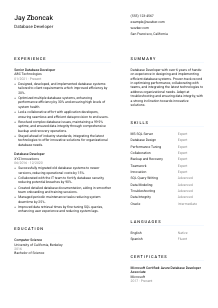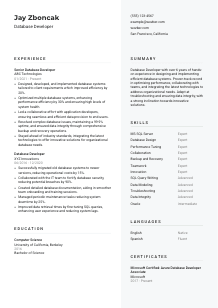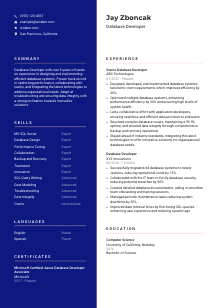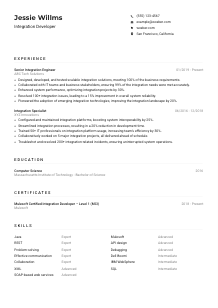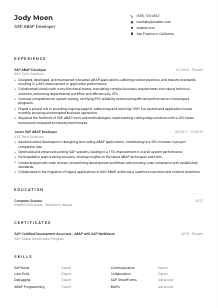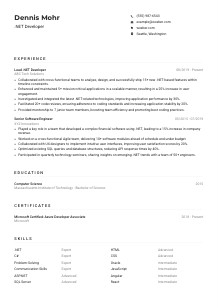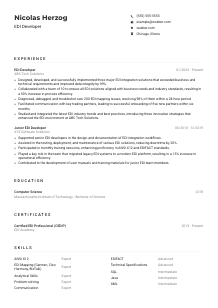Database Developer Resume Example
Designing schemas but feel your resume lacks structure? Dive into this Database Developer resume example, optimized using Wozber free resume builder. See how you can translate your data acumen to match job requirements, building a career as organized and efficient as your databases!
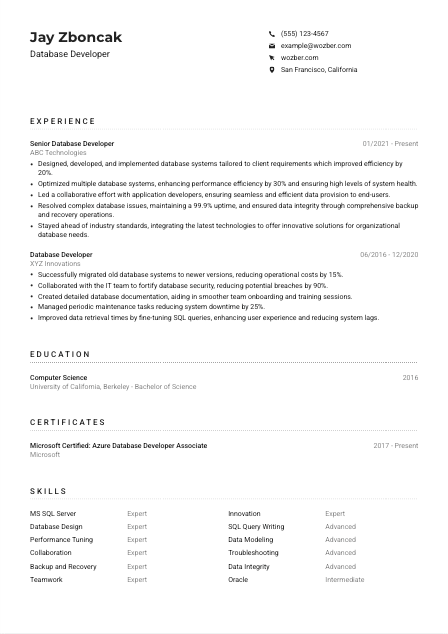
How to write a Database Developer resume?
Hello, aspiring Database Developer! If you're looking to boost your database development career into the stratosphere, you've landed at the right guide. It's not just about listing your technical prowess; it's about weaving your skills, accomplishments, and passion into a narrative that resonates with hiring managers. And yes, making it ATS-compliant is key.
Through this guide, we'll transform your resume into a beacon for opportunities, using Wozber's free resume builder and its treasure trove of tools like ATS-friendly resume templates and the ATS resume scanner for keywords optimization. Ready to craft a resume that not only ticks all the boxes but also tells a compelling story about your database mastery?
Personal Details
Start crafting your resume with the right introduction. Your personal details section isn't just administrative trivia; it's the opening volley in your campaign to capture the hiring manager's attention. Here's how to tailor it specifically for a Database Developer role, making sure every word counts.
1. Name as Your Brand
Begin with your name, clear and bold. It's not just a label; it's the title of your professional narrative. Make it stand out, as this is the first detail that catches the hiring manager's eye. Using a readable font, perhaps a size or two larger than the other text, sets the right tone.
2. Job Title Alignment
Immediately below your name, specify your targeted job title, in this case, "Database Developer." This clear indication aligns your application with the job posting and acts as an initial handshake with the hiring manager, signaling your focused intent.
3. Contact Essentials
Include your primary phone number and a professional email address. A missed digit or a quirky email can make the wrong first impression. Ensure your contact information is accurate and reflects a professional demeanor. Think: firstname.lastname@domain.com.
4. Location Matters
Mention "San Francisco, California," as per the job's location requirement. By confirming your current location or willingness to relocate, you immediately address one of the hiring manager's logistical considerations, smoothing the path for further consideration.
5. Digital Presence
If you have a LinkedIn profile or a professional website showcasing your portfolio or projects, include it. Make certain it's up-to-date and mirrors the accomplishments and skills listed on your resume. This extends your professional story beyond the resume, providing a deeper insight into your capabilities and achievements.
Takeaway
In crafting your personal details section, think of it as laying down the red carpet for your resume narrative. Ensure it's neat, professional, and directly aligned with the Database Developer role you're aiming for. This is your first impression—make it count.





Experience
Your experience section is where you shine a spotlight on your journey in the world of database development. It's not just about the roles you've held; it's about narrating your contribution to the field, showcasing achievements that resonate with the job requirements.
- Designed, developed, and implemented database systems tailored to client requirements which improved efficiency by 20%.
- Optimized multiple database systems, enhancing performance efficiency by 30% and ensuring high levels of system health.
- Led a collaborative effort with application developers, ensuring seamless and efficient data provision to end‑users.
- Resolved complex database issues, maintaining a 99.9% uptime, and ensured data integrity through comprehensive backup and recovery operations.
- Stayed ahead of industry standards, integrating the latest technologies to offer innovative solutions for organizational database needs.
- Successfully migrated old database systems to newer versions, reducing operational costs by 15%.
- Collaborated with the IT team to fortify database security, reducing potential breaches by 90%.
- Created detailed database documentation, aiding in smoother team onboarding and training sessions.
- Managed periodic maintenance tasks reducing system downtime by 25%.
- Improved data retrieval times by fine‑tuning SQL queries, enhancing user experience and reducing system lags.
1. Unpack the Job Essentials
Dive deep into the job description, identifying key responsibilities like "Optimize database systems for performance efficiency" or "Collaborate closely with application developers." These phrases are your guiding stars for tailoring your resume.
2. Role and Company Structure
Detail your experience in reverse chronological order. For each role, list your title, the company, and your tenure there. This straightforward format ensures clarity and helps the hiring manager quickly understand your career progression.
3. Achievement-Based Narratives
Transform every bullet point under each role into a story of success. For instance, share how you "Optimized database systems, enhancing performance efficiency by 30%" or "Led collaborative efforts with application developers." Use action words and quantify achievements to add credibility and weight.
4. Impact Through Numbers
Whenever possible, quantify your accomplishments. Did you reduce downtime? By how much? Did your optimizations lead to faster data retrieval? Specific figures make your contributions tangible and memorable.
5. Relevance is Key
Adhere strictly to experiences that highlight your expertise and contributions as a Database Developer. The aim is to craft a narrative so compelling that the hiring manager can't help but see you as an indispensable asset to their team.
Takeaway
The experience section is your professional storyboard. Here, you're not just listing your job history; you're showcasing your evolution and how each chapter of your career has equipped you to excel in this new role. Take the time to get this right; it's the core of your resume's narrative.
Education
In the realm of database development, your educational background establishes the academic foundation of your expertise. While it may seem like a formality, presenting your education correctly is crucial for making a strong impression.
1. The Degree Requirement
Highlight your "Bachelor's degree in Computer Science, Information Systems, or a related field" prominently. This directly addresses a core requirement from the job description, immediately positioning you as a qualified candidate.
2. Structure for Clarity
Present your educational background clearly and concisely. Begin with your degree, followed by the field of study, institution, and graduation year. This clean, easy-to-follow format allows the hiring manager to quickly verify your academic qualifications.
3. Degree Specifics
If the job calls for a specific degree or discipline, ensure it's listed exactly as it appears in your educational credentials. For example, a "Bachelor of Science in Computer Science" directly ties into the job requirements, reinforcing your suitability.
4. Coursework and Projects
Mentioning specific courses or projects can be particularly compelling if they align closely with the job's requirements or demonstrate practical experience with database systems. For more senior roles, this might be less relevant, but for early-career professionals, it can be a significant differentiator.
5. Beyond Academics
If you have academic achievements that reflect your dedication or leadership—such as honors, clubs, or relevant project work—include these. They offer a glimpse into your non-technical skills and personal qualities, adding depth to your academic narrative.
Takeaway
Your education section does more than list degrees; it showcases the foundation of your expertise and your journey in becoming a Database Developer. Make sure it aligns perfectly with what the job seeks, reinforcing the narrative that you are the ideal candidate for the role.
Certificates
In the ever-evolving world of database development, certificates are badges of honor that validate your expertise and commitment to staying at the forefront of technology. Here's how to highlight them in a way that speaks volumes to your prospective employer.
1. Matching with Job Necessities
Refer back to the job description, which mentions a preference for "familiarity with commonly used database developer certifications such as Microsoft Certified: Azure Database Developer Associate." Listing this certification, if you have it, directly aligns with the employer's expectations.
2. Selective Highlighting
Prioritize certificates that have the most relevance to the job description. It's not about the quantity but the quality and direct relevance of the certifications to the position you're applying for. This strategic selection ensures your resume is streamlined and impactful.
3. Clear Dating
Include the acquisition date of each certificate, particularly if they are recent. This indicates to the employer that you are up-to-date with the latest technologies and methodologies in database development, reinforcing your expertise.
4. Continuous Learning
Emphasize your ongoing commitment to professional development. Regularly updating your skill set and certifications, especially in areas directly relevant to your career trajectory, showcases your dedication to excellence and adaptability in the fast-paced tech landscape.
Takeaway
Certificates are not just accolades; they're evidence of your ongoing journey in mastering database development. Highlighting them strategically in your resume tells prospective employers not only where you are now but also signals your commitment to evolving alongside the industry.
Skills
Your skills section is a concise showcase of your professional capabilities. Here, specificity and relevance are your allies. Let's scope out how to curate this vital part of your resume to align impeccably with a Database Developer's role and catch the hiring manager's eye.
1. Deciphering the Job Description
Begin by extracting both the explicit and implicit skill requirements from the job listing. Skills like "Strong experience in writing complex SQL queries" and "Knowledge of best practices in database design" are clear indicators of what the employer values.
2. Tailoring Your Skill Set
For each identified skill, match it with your own experience. Prioritize the listing of your skills to start with those most closely aligning with the job requirements. This not only demonstrates a fit but also immediately grabs the attention of anyone scanning your resume.
3. Clarity and Organization
Resist the urge to list every skill you possess. Focus on the ones that matter most for the role at hand. Organizing your skills in a logical manner, possibly grouping similar ones together, helps the hiring manager grasp your capabilities at a glance.
Takeaway
Your skills section is essentially the proof of your expertise. Tailor it meticulously to match the job you're applying for, demonstrating not just your qualifications but your alignment with the specific needs and culture of the prospective employer. Let your skills shine as a testament to your fit for the role.
Languages
In the globally connected world of technology, language skills can be a distinguishing asset. Even for positions where they're not a primary requirement, showcasing your linguistic abilities can position you as a candidate of choice, especially in diverse and international teams.
1. Revisiting Job Prerequisites
With "High level of fluency in English required" listed in the job description, ensure your proficiency in English is front and center. This direct match positions you as an immediate fit for the team's communication norms.
2. Highlighting Language Proficiency
Clearly state your fluency levels for English and any additional languages. This isn't just about your ability to communicate; it's about demonstrating your readiness to engage in diverse environments or handle projects with international scope.
3. Comprehensive Listing
Even if languages beyond English aren't mentioned in the job description, listing them can offer an edge, showcasing a global perspective and adaptability to multicultural contexts.
4. Realistic Self-Assessment
Be honest about your proficiency levels. Misrepresenting your abilities can lead to awkward situations, particularly if the role later demands those language skills. Integrity here is key.
5. Understanding the Broader Context
For roles that hint at international collaboration or client interaction, being multilingual might be particularly valuable. Even if the job isn't explicitly focused outward, additional languages might prove beneficial for internal diversity and team communication.
Takeaway
Your language skills are a testament to your ability to navigate the world's rich tapestry of cultures. Highlighting your linguistic abilities, even in technology-focused roles, can subtly tip the scales in your favor by portraying you as a versatile, globally-minded professional. Embrace and showcase your languages as part of your unique professional identity.
Summary
The summary is your chance to condense your professional narrative into a compelling snapshot. It should echo the job requirements while encapsulating your experience, skills, and what you bring to the table. Let's craft a summary that sets you apart.
1. Absorbing the Job Soul
Start with a deep dive into the job description, absorbing the essence of what makes this Database Developer role unique. Understand the technical and soft skills needed, the cultural and operational nuances of the company, and how you can genuinely contribute.
2. Opening Highlight
Your first sentence should introduce you as a professional, touching on your years of experience and areas of specialization. "Database Developer with over 6 years of hands-on experience" immediately signals your expertise and direct fit for the role.
3. Core Achievements and Skills
Briefly mention your key achievements, areas of expertise, and how you've applied your skills to make tangible impacts. For instance, referencing your ability to optimize database performance or collaborate with cross-functional teams directly addresses the job requirements.
4. Succinct and Powerful
Aim for brevity and impact. Your summary should be a teaser, inviting hiring managers to delve deeper into your resume. Keep it concise, but make every word count, creating a narrative that's compelling and directly aligned with the role you're seeking.
Takeaway
Think of your summary as the professional handshake that introduces your resume. It's your chance to make a strong first impression, showcasing not just your qualifications, but your passion for database development and your vision for contributing to the company. Tailor it with care, and make it memorable.
Launching Your Journey as a Database Developer
Congratulations! You're now equipped to craft a Database Developer resume that not only meets the mark but truly stands out. Remember, your resume is more than a document; it's a narrative of your professional journey. Use Wozber to write your story with confidence, leveraging its free resume builder, ATS-friendly resume templates, and ATS resume scanner for optimal keyword optimization.
Let your resume be the key that unlocks new opportunities. Ready to take the next step in your career? Your future awaits.

- Bachelor's degree in Computer Science, Information Systems, or a related field.
- A minimum of 5 years of experience in database development and support in MS SQL Server environments.
- Strong experience in writing complex SQL queries, stored procedures, and optimization.
- Knowledge of best practices in database design and data modeling.
- Familiarity with commonly used database developer certifications such as Microsoft Certified: Azure Database Developer Associate.
- High level of fluency in English required.
- Must be located in or willing to relocate to San Francisco, CA.
- Design, develop, and implement database systems based on customer requirements.
- Optimize database systems for performance efficiency, regularly monitor system health, and perform periodic maintenance tasks.
- Collaborate closely with application developers to ensure the database systems provide necessary data seamlessly and efficiently.
- Conduct troubleshooting, backup, and recovery operations to ensure data integrity and availability.
- Stay updated with the latest technologies and best practices to implement innovative solutions for the organization's database needs.





